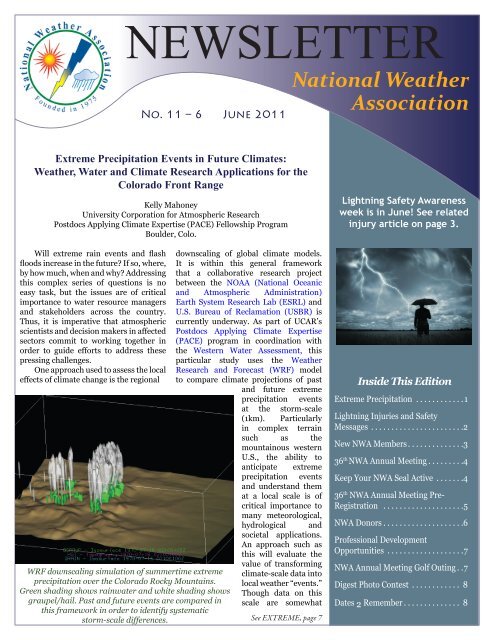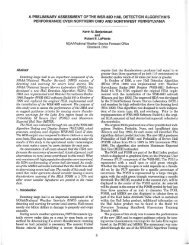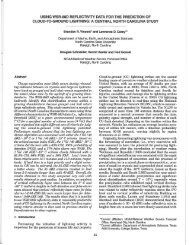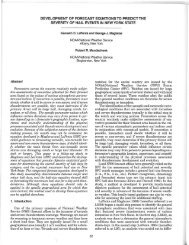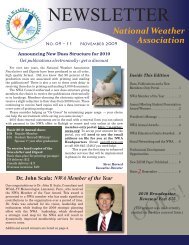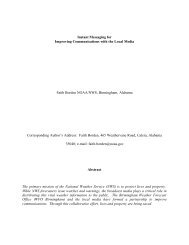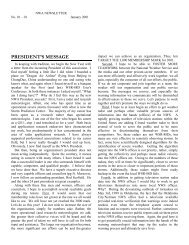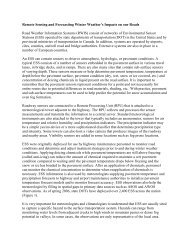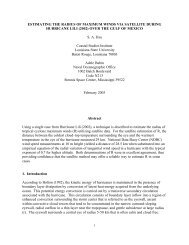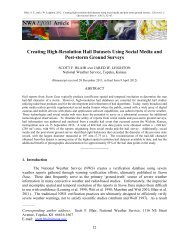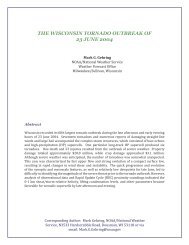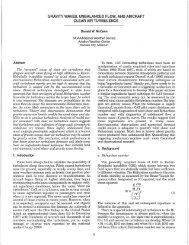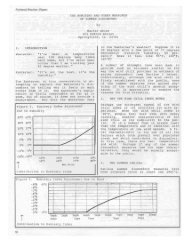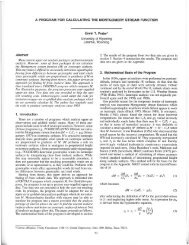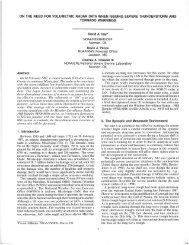NEWSLETTER - National Weather Association
NEWSLETTER - National Weather Association
NEWSLETTER - National Weather Association
You also want an ePaper? Increase the reach of your titles
YUMPU automatically turns print PDFs into web optimized ePapers that Google loves.
<strong>NEWSLETTER</strong><br />
<strong>National</strong> <strong>Weather</strong><br />
<strong>Association</strong><br />
No. 11 – 6 June 2011<br />
Extreme Precipitation Events in Future Climates:<br />
<strong>Weather</strong>, Water and Climate Research Applications for the<br />
Colorado Front Range<br />
Kelly Mahoney<br />
University Corporation for Atmospheric Research<br />
Postdocs Applying Climate Expertise (PACE) Fellowship Program<br />
Boulder, Colo.<br />
Will extreme rain events and flash<br />
floods increase in the future? If so, where,<br />
by how much, when and why? Addressing<br />
this complex series of questions is no<br />
easy task, but the issues are of critical<br />
importance to water resource managers<br />
and stakeholders across the country.<br />
Thus, it is imperative that atmospheric<br />
scientists and decision makers in affected<br />
sectors commit to working together in<br />
order to guide efforts to address these<br />
pressing challenges.<br />
One approach used to assess the local<br />
effects of climate change is the regional<br />
WRF downscaling simulation of summertime extreme<br />
precipitation over the Colorado Rocky Mountains.<br />
Green shading shows rainwater and white shading shows<br />
graupel/hail. Past and future events are compared in<br />
this framework in order to identify systematic<br />
downscaling of global climate models.<br />
It is within this general framework<br />
that a collaborative research project<br />
between the NOAA (<strong>National</strong> Oceanic<br />
and Atmospheric Administration)<br />
Earth System Research Lab (ESRL) and<br />
U.S. Bureau of Reclamation (USBR) is<br />
currently underway. As part of UCAR’s<br />
Postdocs Applying Climate Expertise<br />
(PACE) program in coordination with<br />
the Western Water Assessment, this<br />
particular study uses the <strong>Weather</strong><br />
Research and Forecast (WRF) model<br />
to compare climate projections of past<br />
and future extreme<br />
precipitation events<br />
at the storm-scale<br />
(1km). Particularly<br />
in complex terrain<br />
such as the<br />
mountainous western<br />
U.S., the ability to<br />
anticipate extreme<br />
precipitation events<br />
and understand them<br />
at a local scale is of<br />
critical importance to<br />
many meteorological,<br />
hydrological and<br />
societal applications.<br />
An approach such as<br />
this will evaluate the<br />
value of transforming<br />
climate-scale data into<br />
local weather “events.”<br />
Though data on this<br />
scale are somewhat<br />
storm-scale differences. See EXTREME, page 7<br />
Lightning Safety Awareness<br />
week is in June! See related<br />
injury article on page 3.<br />
Inside This Edition<br />
Extreme Precipitation ............ 1<br />
Lightning Injuries and Safety<br />
Messages ....................... 2<br />
New NWA Members.............. 3<br />
36 th NWA Annual Meeting......... 4<br />
Keep Your NWA Seal Active ....... 4<br />
36 th NWA Annual Meeting Pre-<br />
Registration .................... 5<br />
NWA Donors.................... 6<br />
Professional Development<br />
Opportunities ................... 7<br />
NWA Annual Meeting Golf Outing. . 7<br />
Digest Photo Contest ............. 8<br />
Dates 2 Remember............... 8
Mechanisms of Lightning Injury Should Affect Lightning Safety Messages<br />
Mary Ann Cooper, MD<br />
University of Illinois at Chicago<br />
Chicago, Ill.<br />
Ronald L. Holle<br />
Holle Meteorology & Photography<br />
Oro Valley, Ariz.<br />
Lightning continues to be one of the leading causes of weather fatalities. There are several mechanisms of lightning<br />
injury accepted by the meteorology and lightning community:<br />
• Direct strike<br />
• Contact potential<br />
• Side splash/flash<br />
• Earth potential rise/ground current<br />
• Step voltage<br />
• Ground arcing<br />
• Upward streamer/leader and<br />
• Blunt, concussive injury<br />
However, victim accounts and newspaper reports continue to cite a direct strike as nearly the only cause of injury. Probably<br />
a truer distribution of injury by mechanisms illustrated in the graphic below.<br />
Factors that lead to misreporting the actual mechanism include:<br />
• Lightning occurring too fast to be seen<br />
accurately<br />
• Confusion/amnesia of the victim<br />
• Untrained eyewitnesses with only partial views<br />
• The brain’s normal tendency to ‘fill in the<br />
blanks’<br />
• Emotionally charged, unexpected event<br />
• Lack of knowledge that other mechanisms exist<br />
• Belief in common myths / misinformation<br />
• Few incidents investigated by trained experts<br />
• No formal criteria for incident investigation<br />
• Delays in reporting if in remote locations<br />
• Newspaper reports taken from non-witnesses<br />
or police reports<br />
Estimated distribution of lightning injuries by mechanism<br />
• Reporter deadlines that preclude adequate research and<br />
• Over dramatization / exaggeration of most life events in the last decade<br />
See LIGHTNING, page 3<br />
2 <strong>National</strong> <strong>Weather</strong> <strong>Association</strong> ~ www.nwas.org
Welcome to the <strong>National</strong> <strong>Weather</strong> <strong>Association</strong><br />
The following members joined the NWA in May 2011.<br />
Regular/Military/Retired<br />
Scott Blair<br />
Dr. Carl Boldt<br />
Sherrod Bybee<br />
William Clements<br />
William Elser<br />
Richard Engle<br />
John Farris<br />
Jairo Franco<br />
Minh Freed<br />
Ferdinand Furer<br />
Fiona Gorostiza<br />
Jeff Hawks<br />
Adam Hill<br />
Veronica Holtz<br />
Scott Izynski<br />
Lauren Jones<br />
Mike Knechtel<br />
Denise Laudeman<br />
Samantha Matthews<br />
John McCoy<br />
Steven A. Morris<br />
Jan Null<br />
Meghan Reinert<br />
Ronan Rhodes<br />
Rebecca Rosenstiel<br />
David Seibert<br />
Benjamin Shoemake<br />
Gregory Stephens<br />
Thaddeus Truitt<br />
Eric Wilhelm<br />
David Witham<br />
Ben Zimmerman<br />
Students<br />
Ben Alonzo<br />
Clinton Bourgeois<br />
Christina Branson<br />
Eric Brewster<br />
James Bryant<br />
Paul Carlone<br />
Elissa Coambs<br />
Mark Elyea<br />
Danielle Hill<br />
Maya Itagaki<br />
Adam Lorch<br />
Jeff Makowski<br />
Scott Mowaswes<br />
Jeffrey Nelson<br />
Robert Nelson<br />
Diamilet Perez-Betancourt<br />
Kristin Smedley<br />
Scott Thrasher<br />
Jaime Travers<br />
Gian Villamil<br />
LIGHTNING continued from page 2<br />
The vast majority of errors are unintentional on the part of the<br />
survivor, witnesses or reporters. Most reporters are simply doing<br />
the best job they can with limited time, access to sources and<br />
knowledge of lightning physics. It is far better to work with them<br />
to include injury prevention ideas in their reports than to worry<br />
about minor inaccuracies in the story details.<br />
The widespread belief that nearly all lightning injuries are<br />
from direct strikes has led to educational efforts that overly<br />
stress precautions to avoid direct strike that, in fact, are much<br />
less common than other mechanisms. Educational efforts<br />
should include other mechanisms of injury, particularly when<br />
combinations of these mechanisms may occur when larger<br />
numbers of people are involved.<br />
Public education should also stress proactive rather than<br />
reactive behavior. Knowing the weather patterns and the forecast<br />
for one’s area is essential when an outdoor activity is planned.<br />
Simply delaying an activity or planning alternate activities can<br />
save lives.<br />
Making injury prevention messages simple and direct<br />
is probably the most important point. The slogan of the<br />
Lightning Safety Week, “When Thunder Roars, Go Indoors”<br />
is easily remembered by preschoolers as well as adults when<br />
thunderstorms occur. The Lightning Safety Week website, www.<br />
lightningsafety.noaa.gov, has many useful tools for teaching all<br />
ages about lightning injury avoidance.<br />
A slide series on this subject that can be used in outreach<br />
activities is available for download at www.nwas.org/meetings/<br />
nwa2010/. You can also read more about this subject at<br />
www.vaisala.com/Vaisala%20Documents/Scientific%20<br />
papers/11.Cooper,%20Holle.pdf.<br />
Part of the reason many of us are so<br />
passionate about weather is the good we<br />
can provide to our customers, whether it be<br />
the public, a business client, a student or our<br />
neighbors. Providing life-saving information<br />
about threatening weather can provide a<br />
great level of satisfaction to what otherwise<br />
could be just a job. This article stresses the<br />
many ways deaths due to lightning strikes can<br />
occur and, more importantly, highlights public<br />
safety messages to help prevent personal<br />
injury or death.<br />
This article has been requested as part of a<br />
series of professional development articles<br />
highlighting important work presented<br />
orally or via poster at the 35 th NWA Annual<br />
Meeting. I hope this piece challenges you<br />
to continually find ways to enhance what<br />
many of you are already doing—providing<br />
outstanding operational weather support to<br />
your customers.<br />
Kenneth Carey<br />
Chair, NWA Professional Development<br />
Committee<br />
June 2011 ~ Newsletter 3
36 th NWA Annual Meeting<br />
Oct. 15-20, 2011- Birmingham, Alabama<br />
Get Ready! Get Set! And Register Now!<br />
THE ANNUAL MEETING OVERVIEW:<br />
The End Game - From<br />
Research and Technology<br />
to Best Forecast and<br />
Response<br />
Saturday, Oct. 15: 9 th Annual Golfing for Scholarships Outing<br />
This NWA scholarship fundraising event will be held at Bent Brook Golf Club in Birmingham, the tee times start<br />
around 11:30 a.m. (or as late as 12:30). Cost is $95 per person which includes golf, cart, lunch, prizes and donation<br />
to scholarship fund. Proceeds over costs will go to support the NWA scholarship program.<br />
Sunday, Oct. 16: Broadcast Meteorology Workshop<br />
This includes special presentations and other activities appropriate for the continuing education of weathercasters -<br />
it is open to all NWA members. Bring a DVD of a recent weathercast for discussion for the evening’s DVD Swap.<br />
The 4 th NWA Student Session provides guidance for students regarding how to best prepare themselves to enter the<br />
workplace. Includes a large student poster session and networking opportunities with broadcasters and other NWA<br />
members. Resume/DVD critique session included!<br />
Monday-Thursday, Oct. 17 - 20: General Sessions<br />
General Sessions will consist of both oral and poster sessions targeting the meeting theme, “The End Game – From<br />
Research and Technology to Best Forecast and Response.” The annual Awards Luncheon will be held on Wednesday,<br />
Oct. 19.<br />
Special Feature - Joint Meeting with 7 th Annual GOES Users Conference: The GOES Users Meeting (GUC)<br />
will be in the Wynfrey Hotel Oct. 20-21 with joint NWA-GUC sessions and presentations scheduled for Thursday<br />
Oct. 20. NWA attendees are encouraged to attend the GUC sessions scheduled for Friday, Oct. 21. Visit http://<br />
directreadout.noaa.gov/GUC_VII for additional information.<br />
Easier to Keep that Seal<br />
In these times of uncertainty in our industry, the NWA Seal of Approval is becoming<br />
increasingly important in landing and keeping a job in Broadcast Meteorology. For that reason,<br />
the Broadcast Committee and Subcommittee on Standards and Ethics, with the approval of the<br />
NWA Council, has come up with a new policy to make it easier for Seal holders to keep their Seals<br />
and encourage timely recertification.<br />
Seal holders must recertify every three years to keep their Seal of Approval, earning<br />
continuing education credits over that three-year period. Up until now, Seal holders who did not<br />
recertify by the end of the third year have had their Seals revoked and have had to wait five years before applying for the Seal<br />
again. As of June 1, 2011, that policy changed. There is now a four-month grace period for recertification. The deadline to<br />
recertify without late penalties is still Dec. 31, but Seal holders now have until April 30 to earn continuing education units<br />
(CEUs) and recertify before a Seal is revoked. Also, there is now no waiting period to reapply for the Seal if it is lost because<br />
of failure to recertify. In a nutshell, here is the new policy as outlined in the Broadcast Committee’s Qualifications and<br />
Procedures recently approved by the NWA Council. To recertify, Seal holders must:<br />
1. Earn CEUs, present documentation of them and a $75 recertification fee by Dec. 31 of every third year (no change) or<br />
2. By the end of February following Seal expiration, earn CEUs, present documentation and a $150 recertification fee or<br />
3. By the end of April following Seal expiration, earn CEUs, present documentation and a $300 recertification fee. If a<br />
Seal holder does not recertify by May first following every third year, the Seal will be revoked, but the member may<br />
immediately reapply without a waiting period. However, the previous Seal holder will have to start the process from<br />
the beginning, taking a written exam and passing an on-air evaluation.<br />
The Broadcast Committee hopes these new guidelines will encourage Seal holders to recertify on time. It also gives<br />
members a way to quickly re-earn the Seal if they lose it. The new Qualifications and Procedures and all the ways to earn<br />
CEUs are on the NWA website under the “Broadcaster’s Seal” link, http://www.nwas.org/SEAL/.<br />
4 <strong>National</strong> <strong>Weather</strong> <strong>Association</strong> ~ www.nwas.org<br />
Nick Walker<br />
NWA Broadcast Committee Chair
Pre-register for the 36 th NWA Annual Meeting by Sept. 30<br />
The preregistration fee includes a preprint volume with program and abstracts. For the period of days registered,<br />
it also includes: admission to all oral presentations, poster sessions and exhibit sessions plus coffee/refreshment<br />
breaks. Full registration includes the Wednesday Awards Luncheon. Registration after the preregistration period<br />
will result in higher fees. Non-members will be eligible for member rates if they join now!<br />
2011 PREREGISTRATION FEES: (through Sept. 30)<br />
Sunday, Oct. 16: Broadcast Workshop and Tape Swap<br />
8 a.m. – 11 p.m.<br />
$125 NWA members and presenters<br />
$55 students and retired members<br />
$175 for non-members<br />
$105 for non-member students and retired<br />
Sunday, Oct. 16: Student Seminar and Resume<br />
night session 1 p.m.-11 p.m.<br />
$35 NWA student members and presenters<br />
$55 for non-member students<br />
Monday-Thursday, Oct. 17-20:<br />
General Sessions/Activities<br />
$295 NWA members and presenters<br />
$130 students and retired members<br />
$350 for non-members<br />
$190 for non-member students and retired<br />
Special One-Day Rates for period Oct. 17-20<br />
$125 NWA members and presenters<br />
$55 students and retired members<br />
$180 for non-members<br />
$90 for non-member students and retired<br />
Special, All events Sunday-Thursday<br />
$385 NWA members<br />
$475 for non-members<br />
Student Special, All events Sunday-Thursday<br />
$150 NWA members<br />
$225 for non-members<br />
Program Committee, All events Sunday-Thursday<br />
$95 Program Committee members<br />
PREREGISTRATION ONLINE by credit card (AmEx, Discover, MC or Visa):<br />
Attending Broadcast workshop and/or most of the<br />
General Session: www.nwa-registration.org/register.shtml<br />
Attending Broadcast Workshop and only one or two days<br />
of the General Session:<br />
www.nwa-registration.org/registerbyday.shtml<br />
PREREGISTRATION BY MAIL:<br />
Complete this form and email it OR mail it with full payment of fees by Sept. 30, 2011 to: NWA Meeting, 228 West<br />
Millbrook Road, Raleigh NC 27609-4304 USA. Make payment to “NWA” in U.S. funds by a US bank check, money<br />
order or government/institution purchase order.<br />
Name (Preferred for nametag):<br />
Employer, School or other Affiliation (for nametag):<br />
City/State (for nametag):<br />
Telephone number and e-mail address:<br />
Arrival Date at meeting:<br />
Departure Date from meeting:<br />
Pre-registration fees (see above):<br />
Number of extra Luncheon tickets ($40 each):<br />
I am attending Oct. 17 Icebreaker - Monday evening (Free):<br />
I am attending the 9th annual “Golfing for Scholarships” event, Sat., Oct 15th ($95):<br />
Total funds enclosed:<br />
Circle all that apply:<br />
NWA Member NWA Local Chapter Member NWA Broadcast Seal Holder Non-member Student Retired<br />
Session Chair Presenter Program Committee Member Local Arrangements Committee Member<br />
I will bring a DVD to the DVD Swap I’ll attend the DVD Swap but not bring a DVD<br />
I’m a student wishing to have broadcast DVD critiqued at Sunday Resume/DVD session<br />
June 2011 ~ Newsletter 5
NWA Donors Help Us Get it Done<br />
Following are the individuals who made donations of $25 or greater to the NWA Sol Hirsch Education Fund and/or<br />
to the NWA General Fund for calendar year 2010. The NWA heartily thanks all members who have provided these extra funds<br />
to help advance the mission of the <strong>National</strong> <strong>Weather</strong> <strong>Association</strong>!<br />
$500+<br />
Benjamin C. Hablutzel<br />
Thomas E. Skilling III<br />
$250 - $499<br />
Dr. Elbert W. Friday Jr.<br />
Troy Kimmel<br />
Brian G. Smith<br />
$100 - $249<br />
C. Donald Ahrens<br />
Robert Ballard<br />
Bob Breck<br />
Rodger A. Brown<br />
Mary M. Cairns<br />
Dr. Jose A. Colon<br />
Larry Cosgrove<br />
Dr. Kenneth C. Crawford<br />
Walter H. Drag<br />
Roger Edson<br />
Renee R. Fair<br />
Ted Fathauer<br />
Floyd F. Hauth<br />
G. Chet Henricksen<br />
David I. Knapp<br />
Henry Lau<br />
Richard L. Livingston<br />
Celia A. Miner<br />
Capt. Craig Nelson<br />
Ashton G. Peyrefitte Jr.<br />
George D. Phillips<br />
Edward D. Priselac<br />
Joseph T. Schaefer<br />
Gerald F. Watson<br />
Steven J. Weiss<br />
John A. White III<br />
Gregory E. Wilk<br />
$25 - $99<br />
Benjamin F. Abell<br />
Wendy E. Abshire<br />
Donald J. Aycock<br />
Richard C. Bagby<br />
William J. Bellis<br />
Brian Billings<br />
Warren Blier<br />
Prof. Lance F. Bosart<br />
S. Edward Boselly III<br />
Dr. Roscoe Braham Jr.<br />
Thomas B. Brannon<br />
Frank C. Brody<br />
Janice Bunting<br />
Philip A. Calabrese<br />
Gary A. Cannalte Jr.<br />
Eward M. Carlstead<br />
Gary M. Carter<br />
Robert E. Clark<br />
Stephen F. Corfidi<br />
J. Paul Dallavalle<br />
Joseph W. Dellicarpini<br />
Lee G. Dickinson<br />
Edward R. Flenz<br />
Gregory Forrester<br />
George L. Frederick Jr.<br />
Kurtis Goertz<br />
Charles Guard<br />
Dean Gulezian<br />
Peter Harris<br />
Wayne Hart<br />
James H. Henderson<br />
Sol Hirsch<br />
John P. Hoppes<br />
Andrew H. Horvitz<br />
Kerry M. Jones<br />
Albert J. Kaehn Jr.<br />
David H. Kitzmiller<br />
Carolyn M. Kloth<br />
John A. Lasley Jr.<br />
Thomas Laufer<br />
Laurence G. Lee<br />
Daniel M. Lipinski<br />
Steven Listemaa<br />
Gerald Machnee<br />
Dennis H. McCarthy<br />
Thomas P. McGuire<br />
William Eric McLin<br />
Thomas C. Messner<br />
Joe Moreno<br />
Harvey L. Moskowitz<br />
Michael P. Nelson<br />
Craig & Cynthia Nelson<br />
Marian D. Peleski<br />
Russell L. Pfost<br />
Ron W. Przybylinkski<br />
The President’s Message<br />
by Patrick Market will<br />
return in the July edition<br />
of our newsletter.<br />
David Radell<br />
Adrian A. Ritchie Jr.<br />
David W. Rogers<br />
Theresa Rossi<br />
Joseph Rua<br />
Larry Ruthi<br />
Gary E. Sanger<br />
Don Sarreals<br />
Stephen H. Scolnik<br />
Roger G. Seyfert<br />
Nick Siebold<br />
Timothy R. Speece<br />
Merril David Teller<br />
David C. Theophilus<br />
John D. Thomas<br />
Jeffrey S. Tongue<br />
Dr. Jay Trobec<br />
Daniel Valle<br />
Eleanor Vallier-Talbot<br />
Connor Vernon<br />
Gary S. Wade<br />
Jeff S. Waldstreicher<br />
Brian R. Waranauskas<br />
John G. Waunsch<br />
Niel J. M. Wheeler<br />
Donald E. Wuerch<br />
If you’d like to help with a donation, please contact us. Our members’ generosity allows us<br />
to achieve so much!<br />
6 <strong>National</strong> <strong>Weather</strong> <strong>Association</strong> ~ www.nwas.org
NWA Sponsored Annual Meetings/<br />
Conferences<br />
Aug. 4-6: 15 th Annual High Plains Conference<br />
Sponsored by the Wichita and High Plains<br />
Chapters of the American Meteorological<br />
Society (AMS)/NWA will be in Wichita, Kan.<br />
www.wichita-amsnwa.org<br />
Oct. 15-20: 36 th <strong>National</strong> <strong>Weather</strong><br />
<strong>Association</strong> Annual Meeting<br />
The 36 th Annual Meeting will be held at the<br />
Wynfrey Hotel in Birmingham, Ala. See<br />
pages 4 and 5.<br />
www.nwas.org/meetings/nwa2011/<br />
Oct. 20-21: 7 th GOES Users’ Conference<br />
This conference will be held in the Wynfrey<br />
Hotel in Birmingham, Ala., with the first day<br />
being a joint meeting with the 36 th Annual<br />
NWA Meeting.<br />
www.nwas.org/meetings/nwa2011/ and<br />
http://directreadout.noaa.gov/GUC_VII/<br />
The <strong>National</strong> <strong>Weather</strong> <strong>Association</strong> presents<br />
<br />
<br />
<br />
Saturday, October 15, 2011<br />
Bent Brook Golf Club<br />
Birmingham, Alabama<br />
Join fellow Annual Meeting attendees for an<br />
afternoon on the links, and help the<br />
NWA’s Scholarship Fund.<br />
$95 per golfer<br />
Includes golf fees, cart, lunch and donation.<br />
Please contact Betsy Kling to sign up<br />
betsykling@wkyc.com<br />
Feb. 27 – March 1, 2012: 2 nd <strong>National</strong> Flood Workshop<br />
Organized by <strong>Weather</strong> Research Center (private, non-profit education and research center) in Houston Texas. It will bring together<br />
agencies, emergency managers, academia and professionals from across the nation to encourage dialogue on various aspects of<br />
flooding. Visit www.nationalfloodworkshop.net, call <strong>Weather</strong> Research Center at (713) 539-3076 or email wrc@wxresearch.org.<br />
Other Meetings & Conferences<br />
Oct. 3 - 5: Ice and Freezing Fog Workshop<br />
Environment Canada will host a workshop on ice and freezing fog in St. John’s, Newfoundland, Canada.<br />
http://collaboration.cmc.ec.gc.ca/science/arma/FRAM_2<br />
Oct. 31 – Nov 2: 15 th Great Divide <strong>Weather</strong> Workshop<br />
NWS Offices in Great Falls and Missoula will host this workshop. This year’s theme is “Sharing Innovative Science and Service”.<br />
www.wrh.noaa.gov/wrh/greatdivide/welcome.php<br />
Jan. 22-26, 2012: 92nd Annual AMS Meeting<br />
New Orleans, La. www.ametsoc.org/MEET/annual/<br />
EXTREME fron page 1<br />
limited in temporal and spatial representation, it may be more<br />
recognizable to users as “weather” – and is also better suited for<br />
scientific analysis of important storm-scale physical processes.<br />
Linking climate-scale projected changes to realistic storm-scale<br />
physical processes may also add confidence to specific future<br />
climate projections.<br />
In this study, warm season extreme precipitation events<br />
in the western U.S. are analyzed by contrasting simulations of<br />
extreme past events with extreme future events; the extreme<br />
event subsets are selected from regional climate projections<br />
supplied by NCAR’s NARCCAP (North American Regional<br />
Climate Change Assessment Program) project. The highresolution<br />
extreme event simulations are analyzed for changes<br />
in overall precipitation amount, intensity, spatial distribution,<br />
type (hail vs. rain) and the maximum terrain elevation at which<br />
extreme precipitation is found.<br />
Through ongoing interaction with hydrologists, engineers,<br />
water resources managers and facility operations personnel<br />
from USBR, as well as organizing group trips into the field to<br />
observe USBR facilities in person, this work strives to bridge the<br />
sometimes-daunting gap that often exists between research and<br />
operational communities. For this work, findings are focused on<br />
application-specific objectives related to dam safety, reservoir<br />
operations and early warning systems designed to monitor<br />
flood risk. Results are ultimately expected to be used in making<br />
decisions for dam safety design updates and repairs by providing<br />
improved estimation of future extreme rainfall amounts.<br />
Learning how to communicate one’s native science to those<br />
outside of the field can be humbling, but the importance of doing<br />
so is strongly motivating. The integration of weather research<br />
and water resources communities resulting from this study is<br />
a critical step toward ensuring that the best available decisionmaking<br />
information is used for both the current and future<br />
management of water resources.<br />
June 2011 ~ Newsletter 7
DIGEST PHOTO CONTEST<br />
With all of the dramatic weather we’ve witnessed<br />
this spring, we know some incredible<br />
photos have been taken by our members!<br />
Submit your best weather photo for a chance to be on the<br />
cover of the <strong>National</strong> <strong>Weather</strong> Digest.<br />
Send us your images by July 30 to be on our next Digest that is currently in<br />
production!! Email them to exdir@nwas.org or mail photos by CD to the<br />
NWA headquarters. (High resolution required—EPS, TIFF and JPG are all<br />
acceptable formats). The NWA Publication Committee judges and selects<br />
photos to be used on the Digests.<br />
Dates2 Remember<br />
Aug. 4-6<br />
15 th Annual High Plains Conference, Wichita, Kan.<br />
Oct. 15-20<br />
36 th <strong>National</strong> <strong>Weather</strong> <strong>Association</strong> Annual Meeting,<br />
Birmingham, Ala.<br />
Oct. 20-21<br />
7 th GOES Users’ Conference, Birmingham, Ala.<br />
Oct. 31-Nov. 2<br />
15 th Great Divide <strong>Weather</strong> Workshop, Bozeman, Mont.<br />
Jan. 22-26, 2012<br />
92 nd Annual AMS Meeting, New Orleans, La.<br />
Feb. 27 – March 1, 2012<br />
2 nd <strong>National</strong> Flood Workshop, Houston, Texas<br />
NWA Newsletter (ISSN 0271-1044)<br />
Contributing Editor: Winnie Crawford<br />
Editor and Publisher: Steve Harned, Executive Director<br />
Published monthly by the <strong>National</strong> <strong>Weather</strong><br />
<strong>Association</strong>, 228 West Millbrook Road, Raleigh, N.C. (USA)<br />
27609-4304; phone ~ (919) 845-1546;<br />
fax ~ (919) 845-2956; exdir@nwas.org; www.nwas.org.<br />
Submit newsletter items directly to the NWA office or to<br />
nwanewsletter@nwas.org. Material received by the 25 th will<br />
be considered for the next month’s issue.<br />
Members receive the Newsletter and <strong>National</strong> <strong>Weather</strong><br />
Digest as part of their regular, student or corporate membership<br />
privileges. Printed Newsletter subscriptions are available<br />
for $25 per year plus extra shipping costs outside U.S. Single<br />
copies are $3. Address, phone number, email and affiliation<br />
changes can now be made online:<br />
member.nwas.org.<br />
<strong>National</strong> <strong>Weather</strong> <strong>Association</strong><br />
228 W. Millbrook Rd.<br />
Raleigh, NC 27609-4304<br />
Address Service Requested<br />
Connecting operational meteorologists in pursuit of excellence in weather forecasting, communication, and service.


